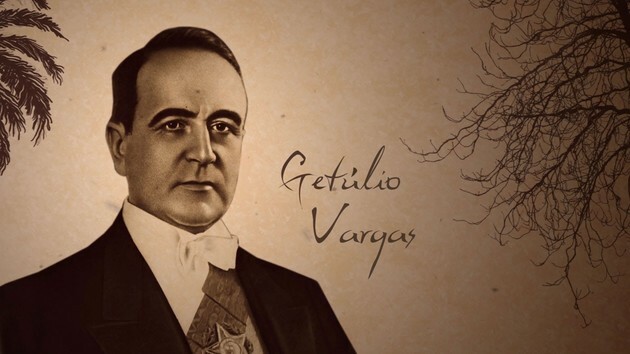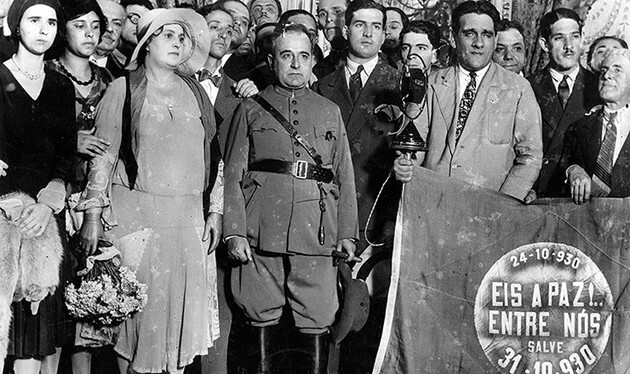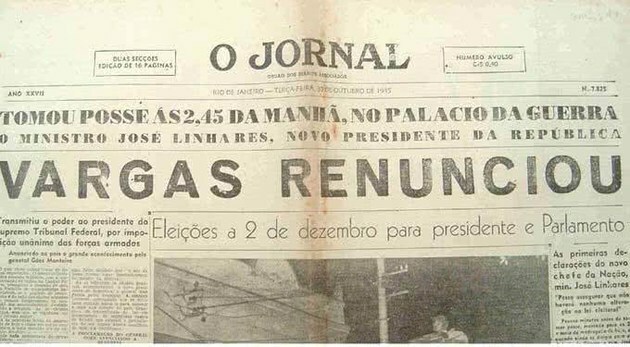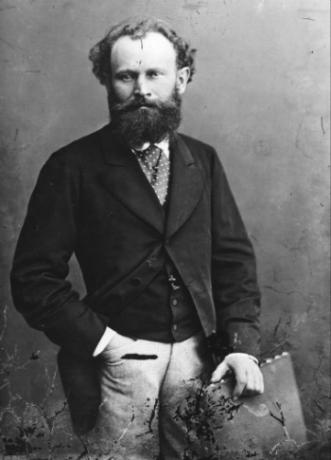Getúlio Dornelles Vargas was a lawyer, politician and president of Brazil born in the city of São Borja (RS), on April 19, 1882 and died on August 24, 1954.
Vargas made his political career in Rio Grande do Sul and reached the presidency of the Republic in 1930.
He was the longest-serving president in the entire republican history of Brazil.

Vargas was elected state deputy in Rio Grande do Sul for the first time in 1909, being re-elected several times.
He married his countrywoman, Darci Sarmanho Vargas (1914-1992), and they had five children. Three of them also turned to politics, such as Alzira Vargas (1914-1992) who was Chief of the Civil Cabinet of the Presidency of the Republic.
Getúlio Vargas became Minister of Finance in 1926, under Washington Luís. He was then president (governor) of Rio Grande do Sul in 1928.
He reached the presidency in 1930, after the Revolution of 30. He first remained in power from 1930 to 1945, when he was deposed and returned via popular vote in 1950.
Four years later, under pressure to resign, he would commit suicide.
Revolution of 30 and Getúlio Vargas

The call café au lait policy, he had strong ties with large landowners and power was shared between the politicians of São Paulo and Minas Gerais.
So Vargas knew he had little chance of winning the election when he ran for president in 1930. When his deputy, João Pessoa, was assassinated, he led a coup against the power of those states.
Vargas headed the 1930 revolution, in which he deposed Washington Luís (1869-1957) and broke the cycle of political alternation between the coffee and livestock oligarchies, in a regime known as governors' policy.
In this way, he won the presidency and remained there from 1930 to 1945.
Complete your study:
- Lieutenantism
- old republic
Provisional Government (1930-1934)
O provisional government of Getúlio Vargas was marked by political instability, as he gave signs that he would not call elections for president of the Republic.
The president tries to articulate with various sectors of society such as the Church and the most visible sign of this approach is the inauguration of Christ the Redeemer, in Rio de Janeiro, on October 12, 1931. He also wins female support by approving the female vote in 1932, but he distances himself from more progressive ideas.
It also created the Ministry of Education and Culture, making primary education mandatory. On the other hand, it ends union freedom and invests in industries as a way to generate employment.
In the political field, Vargas replaces the former state governors, interventors who were the lieutenants who had participated in the Revolution of 1930.
Dissatisfied with these arbitrary measures taken by the president, the state of São Paulo decides to take up arms, in the episode known as 1932 revolution.
After Getúlio's victory, the president calls for legislative elections that confirm him in office and promulgate the Constitution of 1934.
Complete your study:
- Female vote in Brazil
- 1934 Constitution
constitutional government
The promulgation of the 1934 Constitution did not bring stability to the government. Political repression of left-wing parties began, the political police were instituted and the president showed no signs of wanting to leave power.
Communists rebel and are defeated in 1935, while the government uses the fact as a pretext to concentrate even more power.
It is important to remember that the world was experiencing a very large political polarization between the ideologies of the fascism It's from socialism.
See also:
- Communist intent
- Luís Carlos Prestes
- Olga Benário Prestes
new state

With the justification that Brazil was threatened by communism, Vargas closed Congress and declared himself president of Brazil.
Then granted the 1937 Constitution where it concentrated even more powers in the figure of the Executive Power. He declared the political parties extinct and started to govern with great powers.
His government was very close to the fascist model, despite reconciling, not without conflicts, the democratic model.
Economy
During his government, characterized by nationalism and the populism, Vargas established an economic doctrine of state interference in the economy. In it, the State was the main investor and driver of the national economy.
Thus, through the application of funds for the creation of industrial infrastructure, it boosted private capital industries such as the state.
In addition, he established social mechanisms with the Consolidation of Labor Laws, which guaranteed a series of labor rights such as unemployment insurance and paid vacations to urban workers. It should be noted that rural workers have not benefited from these laws.
In 1938, Vargas created the IBGE (Brazilian Institute of Geography and Statistics), the Companhia Siderúrgica Nacional in 1940, the Vale do Rio Doce in 1942 and the Vale do São Francisco hydroelectric plant in 1945.
foreign relations
Foreign relations are characterized by the approximation of the United States and the progressive distancing of the Axis countries, such as Germany and Italy.
This fact would culminate in Brazil's declaration and entry into World War II. Likewise, it provided for the use by Americans of the use of an air base in Natal/RN.
Personally, Vargas was against Brazilian soldiers going into the conflict, fearing that an armed and well-trained group might threaten him.
End of the New State and Fall of Vargas

After the declaration of war on the Axis, the contradictions of the Vargas government became more explicit. Various civil and political associations began to challenge the president's political model and openly question it.
The Miners Manifest where the holding of elections was openly requested and the same was requested during the 1st Brazilian Congress of Writers.
Given this situation, Vargas promulgates the Electoral Code that allowed the creation of political parties and sets the presidential elections for December 2, 1945.
The military also articulates and starts to conspire against the president, especially Generals Goés Monteiro (1889-1956), candidate for the UDN, and Eurico Dutra (1883-1974), candidate for the PSD.
Once again, Getúlio Vargas tries to remain in power through a political maneuver and appoints his brother as head of the Federal District Police. It was said that Benjamim Vargas (1887-1973) would arrest all anti-president generals.
Given this, the military deposes Vargas, who resigns without resistance and retreats to his hometown of São Borja. However, he would not be there for long, as he would be elected senator the following year.
Complete your study:
- new state
- American way of life
- Brazil in World War II
Getúlio Vargas elected President (1950-1954)
The government of Eurico Gaspar Dutra ended without major surprises.
Among the candidates for succession, the former president Getúlio Vargas, who was a candidate for the PTB (Partido Trabalhista Brasileiro) appeared. The victory was quite impressive, but times had changed.
Now, the world was experiencing the polarization of Cold War and the policy was well divided into who supported the United States and the Soviet Union.
Vargas promotes a nationalist policy that involves the creation of state-owned companies such as Petrobras, but he is unable to repeat the same success as the previous administration.
Suicide of Getúlio Vargas

On August 5, 1954, one of Getúlio Vargas' main enemies, the journalist Carlos Lacerda, suffered an attack in front of his house, on Torneleros Street. Lacerda would be shot and survive, but his bodyguard died on the spot.
An investigation ensues, pointing out the main mentor of the crime as Gregório Fortunato (1900-1962), head of the president's personal guard. The opposition immediately asked for the resignation of Getúlio Vargas.
Under pressure, Vargas declared that he would only leave Catete dead and in this way, he committed suicide in the city of Rio de Janeiro, at the Palácio do Catete on August 24, 1954.
He left a will-letter where he explained the reasons for his gesture and stated: "I leave life to enter History".
Curiosities
- Despite the Vargas government having been a dictatorship, for a long time the image of Getúlio as "father of the poor" prevailed.
- One of Vargas' sons, Manuel Sarmanho Vargas, and one of his grandsons, named Getúlio Dornelles Vargas Neto, would also commit suicide.
- The Vargas government coincided with the "chanchada", a popular comedy genre, in which actors such as Oscarito and Grande Otelo stood out.
Read more texts on the topic:
- Brazil Republic
- It was Vargas
- Industrialization in Brazil
- Brazilian History Questions in Enem
- Exercises on the Vargas Era



